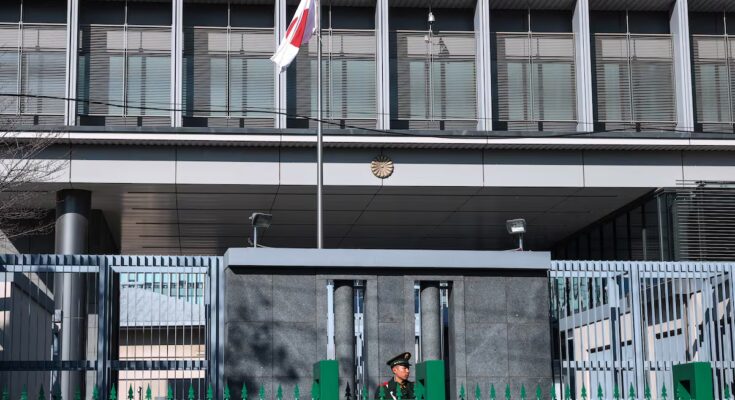Tensions between China and Japan over comments by Japan’s new prime minister, the ultranationalist Sanae Takaichi, on Taiwan continue to rise, burning acres of fragile diplomacy between Beijing and Tokyo. Facing the risk of the dispute going beyond verbal terrain and becoming even darker, the Japanese embassy in Beijing issued a safety warning to its citizens in China on Monday, asking them to be careful on the streets.
“Following recent local media coverage of relations between Japan and China,” reads the notice published on the embassy website, “when departing, we ask you to be very aware of your surroundings, including the presence of suspicious persons, and to do everything possible to ensure your safety when traveling in a group.” The note urges you to take “additional precautions” if traveling with children; You are asked to avoid crowded public spaces and “areas frequented by Japanese” and to leave the area immediately if you detect “suspicious” people or groups.
With the thermometer of bilateral tension red hot and nationalist rhetoric inflamed on Chinese social networks and media, it is impossible not to read the warning while keeping in mind other attacks that Japanese residents in China have suffered in recent times. Last year, a 10-year-old Japanese boy living in the Asian giant was murdered by a Chinese citizen on his way to school. The stabbing occurred on the anniversary of the so-called September 18 Incident, which began the Japanese invasion of Manchuria in 1931 and opened the door to the subsequent Sino-Japanese War.
The communication comes after ten days of tensions between China and Japan. The spark originated in Takaichi’s response in parliament on November 7, in which he assured that a possible attempt by China to block or seize Taiwan could represent “an existential threat” to his country, justifying the deployment of the Japanese Self-Defense Forces.
Although Takaichi assured that his government’s position has not changed and that his comment is nothing new, the statement was a blow to Beijing. China considers the self-governed island of Taiwan a real red line in its foreign policy: a rebellious province, an indispensable part of its territory, and for whose reunification it has never renounced the use of armed force, despite Taipei having the military support of the United States. At the same time, Taiwan is just over 100 kilometers from Japanese territory and lies on vital sea routes to Japan.
Beijing, which has criticized Takaichi for having “severely damaged bilateral relations and challenged the post-war international order,” recalled Japan’s ambassador to Beijing for consultations on Friday, announced live-fire military maneuvers in the Yellow Sea for Monday and carried out coast guard patrols near some disputed islands administered by Tokyo on Sunday.
In an attempt to calm things down, the Japanese government sent Masaaki Kanai, director general of the Asian and Oceanic Affairs Bureau of the Japanese Ministry of Foreign Affairs, to Beijing this week. The senior official met his Chinese counterpart, Liu Jinsong, this Tuesday, although the details of the meeting have not been revealed at the moment.
Meanwhile, the struggle transcends diplomacy, descends into everyday life and reveals a serious situation. Among other things, the Tokyo-Beijing Forum, a meeting between academics from both sides scheduled for this weekend, has been postponed. And tourism has suffered since China’s Foreign Ministry last week asked its citizens to avoid traveling to Japan “due to the deteriorating security environment.”
Cancellations
Chinese airlines recorded around 491,000 ticket cancellations to Japan between Saturday and Monday, nearly a third of total bookings, according to an aviation analyst quoted by the Hong Kong newspaper South China Morning Post.
The Japanese agency Kyodo reported that several large Chinese travel companies have suspended the sale of package tours to Japan, and industry sources added that all travel-related products in this country (whose market is largely fueled by tourists from China, the first nation of origin) have been on pause since the 16th, due to the situation between the two countries.
The dispute has also reached cinema screens, with the release of Japanese films in China being postponed Crayon Shin-chan the Movie: Super Hot!, Burning Kasukabe dancers AND Cells at work!as harvested Global Times, linked to the Chinese Communist Party. “The adjustment is a prudent decision made after careful evaluation of the market performance of imported Japanese films and the opinion of Chinese audiences, as reported in the media by film importers and distributors,” the aforementioned newspaper said.
The current struggle is fueled by historical doubts, unhealed wounds from the past, unresolved territorial disputes and a renewed arms race. Relations have never really healed since the end of World War II, which in China is known as Japan’s surrender in the Second Sino-Japanese War (1937-1945). Beijing celebrated the 80th anniversary in September with a parade of biblical proportions and an intense campaign on the “correct view of history”.
It was predictable that sooner or later the clash between the two countries would come with the new Japanese chief executive at the helm. It may have happened sooner than expected. Takaichi, with a strong patriotic inclination and a propensity to break the pacifist ties with the Army in the country’s Constitution, promised as soon as he took office at the end of October to accelerate the expansion of military spending to reach 2% of GDP next year and not in 2027.
The first woman to rule Japan also considers herself a disciple of the assassinated former Japanese prime minister, Shinzo Abe, who was also nationalist in nature, and under whose tenure diplomatic ties between Beijing and Tokyo creaked as they were at their limit. Abe also made similar comments in 2021, sparking the anger of the People’s Republic, even though he was no longer leading the country.



